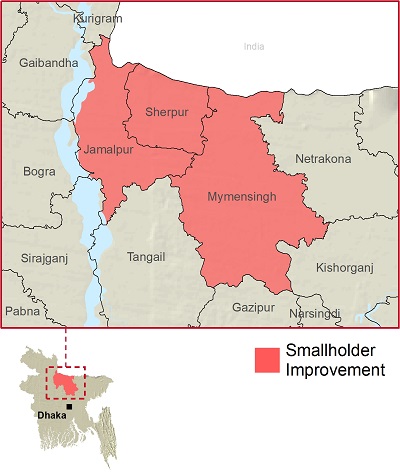Smallholder Agricultural Improvement Project
IFAD Asset Request Portlet
Agrégateur de contenus
Smallholder Agricultural Improvement Project
Smallholder Agricultural Improvement Project
This six-year IFAD-initiated project is working to boost the food production and household incomes of rural poor people in three districts in the north-central area of Bangladesh . The overall goal of the project is to improve food security and living standards while improving the economic infrastructure serving targeted rural households. An important secondary objective is to strengthen key institutions, including community groups, the Department of Agricultural Extension, the local government Engineering Department and NGOs. Specifically, the project:
- contracts suitable NGOs to form, train and support cohesive project participant groups
- strengthens extension services and reorients their approaches to ensure that project participants take part in the planning and implementation of activities
- increases employment opportunities for the landless, functionally landless and women by providing collateral-free credit for income-generating activities
- promotes activities to benefit minority groups and improve basic infrastructure, with a focus on providing adequate access roads and marketing and training facilities
To ensure that project participants have access to credit, the project has established pilot revolving funds (for savings and credit) administered by the community and supported and supervised by suitable NGOs. Private commercial banks are invited to participate in credit supply and to support selected NGOs.
The project is also involved in testing six pilot ecological villages, with community biogas plants and energy-saving stoves, to improve village living conditions.
The target group includes landless and marginalized people and small farmers, with particular attention to households that are headed by women, adivasi (indigenous families) and charlanders (people living on newly formed riverbanks). About 131,000 households are expected to benefit from the project, including 13,000 adivasis and 5,000 charland households. Project funds for indigenous families are channelled into a development fund for their exclusive use. The project also expects to benefit the entire population of the area by improving basic infrastructure and living conditions.
Source: IFAD
